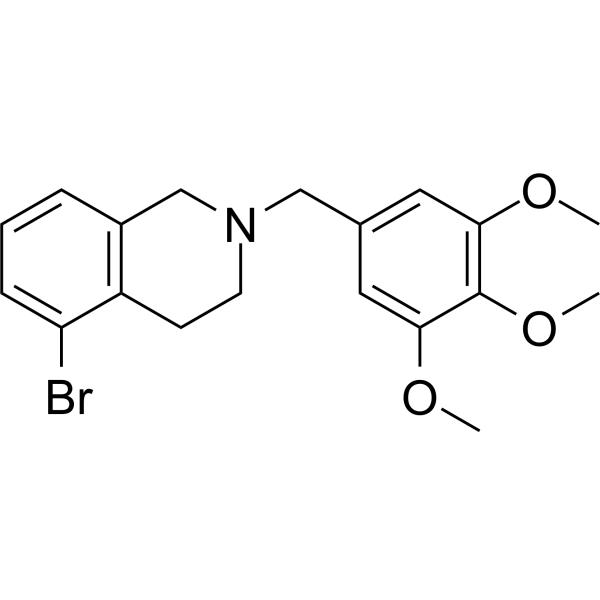- Anti-infection
- Antibody-drug Conjugate/ADC Related
- Apoptosis
- Autophagy
- Cell Cycle/DNA Damage
- Cytoskeleton
- Epigenetics
- GPCR/G Protein
- Immunology/Inflammation
- JAK/STAT Signaling
- MAPK/ERK Pathway
- Membrane Transporter/Ion Channel
- Metabolic Enzyme/Protease
- Neuronal Signaling
- NF-κB
- PI3K/Akt/mTOR
- PROTAC
- Protein Tyrosine Kinase/RTK
- Stem Cell/Wnt
- TGF-beta/Smad
- Vitamin D Related/Nuclear Receptor
- Others
Anti-infection
Apoptosis
Cell Cycle/DNA Damage
Epigenetics
GPCR/G Protein
- 5-HT Receptor
- Adenylate Cyclase
- Adhesion G Protein-coupled Receptors (AGPCRs)
- Adrenergic Receptor
- Amylin Receptor
- Angiotensin Receptor
- Apelin Receptor (APJ)
- Arf Family GTPase
- Arrestin
- Bombesin Receptor
- Bradykinin Receptor
- Cannabinoid Receptor
- CaSR
- CCR
- CGRP Receptor
- Chemerin Receptor
- Cholecystokinin Receptor
- CRFR
- CXCR
- EBI2/GPR183
Immunology/Inflammation
Membrane Transporter/Ion Channel
Metabolic Enzyme/Protease
- 11β-HSD
- 15-PGDH
- 17β-HSD
- 5 alpha Reductase
- Acetolactate Synthase (ALS)
- Acetyl-CoA Carboxylase
- Acetyl-CoA synthetase
- Acyltransferase
- ADAMTS
- Adiponectin Receptor
- Aldehyde Dehydrogenase (ALDH)
- Aldose Reductase
- Amine N-methyltransferase
- Aminoacyl-tRNA Synthetase
- Aminopeptidase
- Aminotransferases (Transaminases)
- Amylases
- Angiotensin-converting Enzyme (ACE)
- ANGPTL
- Apolipoprotein
Neuronal Signaling
Protein Tyrosine Kinase/RTK
Stem Cell/Wnt
- Compound Screening Libraries
- Bioactive Screening Libraries
- •Bioactive Compound Library
- Drug Repurposing Series
- •FDA-Approved Drug Library
- •Drug Repurposing Compound Library
- Natural Products Series
- •Natural Product Library
- •Natural Product-like Compound Library
- Metabolism Series
- •Human Endogenous Metabolite Compound Library
- Disease Related Compound Libraries
- Signaling Pathway Series
- Fragment Libraries
- Diversity Compound Libraries
- •50K Diversity Library
- •5K Scaffold Library
- •3D Diverse Fragment Library
- Virtual Screening
- •50K Virtual Diversity Library
- •10M Virtual Diversity Library
- Recombinant Proteins
- Cytokines and Growth Factors
- Immune Checkpoint Proteins
- CAR-T Related Proteins
- CD Antigens
- Fc Receptors
- Receptor Proteins
- Enzymes & Regulators
- Complement System
- Ubiquitin Related Proteins
- Viral Proteins
- Biotinylated Proteins
- Fluorescent-labeled Recombinant Proteins
- GMP-grade Proteins
- Animal-free Recombinant Proteins
- Protein Expression Service
- Custom Synthesis Service
- ADC-Related Custom Services
- PROTAC-Related Custom Services
- Cytokines and Growth Factors
- Immune Checkpoint Proteins
- CAR-T Related Proteins
- CD Antigens
- Fc Receptors
- Receptor Proteins
- Enzymes & Regulators
- Complement System
- Ubiquitin Related Proteins
- Viral Proteins
- Biotinylated Proteins
- Fluorescent-labeled Recombinant Proteins
- GMP-grade Proteins
- Animal-free Recombinant Proteins
- Others
- View More
CAR-T Related Proteins
- CD27 Ligand/CD70
- CD4
- CD19
- CD27 Ligand/CD70
- CD123
- CD138/Syndecan-1
- Epithelial Cell Adhesion Molecule (EpCAM)
- Folate Receptor 1
- GPC-3
- Guanylate Cyclase 2C
- ErbB2/HER2
- ErbB3/HER3
- c-Met/HGFR
- MSLN
- CA-125
- ROR1
- CEACAM-5
- CD314/NKG2D
- Prostate Specific Membrane Antigen
- CD319/SLAMF7
- TROP-2
- Siglec-6
- Folate Receptor alpha (FR-alpha)
- CD314/NKG2D
- Siglec-3/CD33
- CD27 Ligand/CD70
- CD319/SLAMF7
- ErbB2/HER2
- Siglec-3/CD33
- CD7
- MUC-1/CD227
CD Antigens
- T Cell CD Proteins
- B Cell CD Proteins
- NK Cell CD Proteins
- Macrophage CD Proteins
- Monocyte CD Proteins
- Stem Cell CD Proteins
- Platelet CD Proteins
- Erythrocyte CD Proteins
- Dendritic Cell CD Proteins
- Epithelial cell CD Proteins
- Endothelial cell CD Proteins
- Signal Transduction-related CD Proteins
- Cell Adhesion-related CD Proteins
Receptor Proteins
- Receptor Tyrosine Kinases
- Receptor Serine/Threonine Kinases
- Receptor Tyrosine Phosphatase
- Receptor Guanylyl Cyclase Family
- Cell Adhesion Molecules (CAMs)
- G-Protein-Coupled Receptors (GPCRs)
- Nuclear Receptor Superfamily
- Pattern Recognition Receptors
- Notch family
- Siglec
- Leukocyte Immunoglobin-like Receptors
- Killer-Cell Immunoglobulin-like Receptors
- Cytokine Receptors
Enzymes & Regulators
- Oxidoreductases (EC 1)
- Transferases (EC 2)
- Hydrolases (EC 3)
- Lyases (EC 4)
- Isomerases (EC 5)
- Ligases (EC 6)
- Translocases (EC 7)
- Matrix Metalloproteinases
- ADAMs/ADAMTSs
- Cathepsin
- Carboxypeptidase
- Angiotensin-converting Enzymes
- Caspase
- Carbonic Anhydrase
- Serine/Threonine Kinase Proteins
- Protein Tyrosine Kinases
- Phosphatase
- Topoisomerase
- Protease Inhibitors
- Protein Kinase Inhibitor Peptide (PKI)
- Cyclin-Dependent Kinase Inhibitor Proteins
- Cystatin Family
- Molecular Biology
- •Nucleic Acid Gel Electrophoresis
- •Vector Construction
- •Restriction Endonuclease
- •Materials
- •PCR & qPCR
- •RT-PCR
- •Sequencing
- Protein Biology
- •Protein Sample Preparation
- •Protein Purification
- •Protein Electrophoresis & WB
- •Labeling Kit
- •Multiple Fluorescent Staining
- •Immunoassay
- Cell Biology
- •Cell Culture
- •Cell Analysis
- •3D Cell Culture
- •Cell Isolation
- View More
- Custom Synthesis Service
- Bulk and Custom Synthesis Service
- ADC-Related Custom Services
- PROTAC-Related Custom Services
- Custom Reference Standard Products
- Custom Peptide Synthesis
- Protein Expression Service
- Recombinant Antibody Expression Service
- Protein Crystal Structure Elucidation
- Oligonucleotide Synthesis
- Fluorescent labeling Service
- Custom Synthesis of Stable Isotope-Labeled Compounds
- One-stop CDMO Service
- One-stop Compound Screening Platform
- Virtual Screening
- Molecular dynamics simulation
- Cell-based Compound Screening
- Ion Channel Screening
- Kinase Screening Service
- Surface Plasmon Resonance (SPR) Assay Service
- GPCR Bioassay Screening Services
- Nuclear Receptor Screening Services
- Affinity Mass Spectrometry
- DEL Synthesis and Screening
- Molecular Interaction Assay Service
- Drug Target Identification Service
- AI-Driven Drug Screening
- Molarity Calculator
- Dilution Calculator















































































































































































































![β-Glucuronide-NB-bis[N(Me)-methyl ester]-MMAE](http://file.medchemexpress.eu/product_pic/hy-155313.gif)


































































































































































































































































































































































































































































































































































































































































































































































































































































































































































































































2](http://file.medchemexpress.eu/product_pic/hy-172225.gif)


































































































































































































































































































































































































































































































































![4-(Benzo[d]oxazol-2-yl)aniline](http://file.medchemexpress.eu/product_pic/hy-w029411.gif)



















































































































































































































































































































































































































![5′-O-[Bis(4-methoxyphenyl)phenylmethyl]cytidine](http://file.medchemexpress.eu/product_pic/hy-154198.gif)
















































































































































































![2’-Deoxy-O6-[2-(4-nitrophenylethyl)]guanosine](http://file.medchemexpress.eu/product_pic/hy-154573.gif)









































































![1-(3’-O-[4,4’-Dimethoxytrityl]-alpha-L-threofuranosyl)uridine](http://file.medchemexpress.eu/product_pic/hy-154526.gif)

![[Pt(DACH)(OH)2(ox)]](http://file.medchemexpress.eu/product_pic/hy-w778423.gif)



































![1-(3’-O-[4,4’-Dimethoxytrityl]-alpha-L-threofuranosyl)-thymine](http://file.medchemexpress.eu/product_pic/hy-154319.gif)

































































![1-[3’-O-[(4,4’-Dimethoxytriphenyl)methyl]-a-L-threofuranosyl]-N4-benzoylcytosine](http://file.medchemexpress.eu/product_pic/hy-w048504.gif)







































































































![2-[(3-Pyridyl) pyrrolidin-1-yl]-2’-deoxyinosine](http://file.medchemexpress.eu/product_pic/hy-154575.gif)







![1-[6-(Diethoxyphosphinyl)-2-O-methyl-β-D-ribo-hexofuranosyl]uracil](http://file.medchemexpress.eu/product_pic/hy-154587.gif)









![5′-Deoxy-5-fluoro-N-[(2-methylbutoxy)carbonyl]cytidine](http://file.medchemexpress.eu/product_pic/hy-154779.gif)























































![Octahydrocyclopenta[c]pyrrole](http://file.medchemexpress.eu/product_pic/hy-w125014.gif)












![1-[6-Phosphono-2-O-methyl-β-D-ribo-hexofuranosyl]uracil](http://file.medchemexpress.eu/product_pic/hy-154588.gif)







































![[IrCl(COE)2]2](http://file.medchemexpress.eu/product_pic/hy-w020887.gif)












![5-[[Methyl(2,2,2-trifluoroacetyl)amino]methyl]-2-thiouridine](http://file.medchemexpress.eu/product_pic/hy-152735.gif)

















![2’-Deoxy-2’-fluoro-N3-[3-(tert-butoxycarbonyl) amino]propyluridine](http://file.medchemexpress.eu/product_pic/hy-154725.gif)








































![6-Amino-9-[2-deoxy-β-D-ribofuranosyl]-9H-purine](http://file.medchemexpress.eu/product_pic/hy-154610.gif)
































































![N-Benzoyl-5′-O-[bis(4-methoxyphenyl)phenylmethyl]-3′-deoxyadenosine](http://file.medchemexpress.eu/product_pic/hy-154298.gif)































































































![2′-Amino-5′-O-[bis(4-methoxyphenyl)phenylmethyl]-2′-deoxyuridine](http://file.medchemexpress.eu/product_pic/hy-154424.gif)

















![Benzo[f]tetraphene](http://file.medchemexpress.eu/product_pic/hy-w011577.gif)





![2’-Deoxy-2’-fluoro-N3-[(pyrid-4-yl)methyl]uridine](http://file.medchemexpress.eu/product_pic/hy-154681.gif)










































































































![2-Chloro-9-[(2,3,5-tri-O-acetyl-β-D-ribofuranosyl)]-9H-purine](http://file.medchemexpress.eu/product_pic/hy-154515.gif)























































































![2’-Deoxy-2’-fluoro-N3-[(pyrid-4-yl)methyl]-beta-D-arabinouridine](http://file.medchemexpress.eu/product_pic/hy-154658.gif)
![7-(2-Deoxy-β-D-erythro-pentofuranosyl)-7H-pyrrolo[2,3-d]pyrimidine](http://file.medchemexpress.eu/product_pic/hy-154003.gif)





































![2’-Deoxy-2’-fluoro-N3-[(pyrid-2-yl)methyl]-beta-D-arabinouridine](http://file.medchemexpress.eu/product_pic/hy-152690.gif)























![3-β-D-Ribofuranosyl-6-hydroxymethyl-furano[2,3-d]-pyrimidin-2-one](http://file.medchemexpress.eu/product_pic/hy-154029.gif)


























![2-β-D-Ribofuranosyl-2H-pyrazolo[3,4-d]pyrimidine-4,6-diamine](http://file.medchemexpress.eu/product_pic/hy-152408.gif)










![4,10-Dioxatri cyclo[5.2. 1.02.6]dec-8-ene-3,5-dione](http://file.medchemexpress.eu/product_pic/hy-w102981.gif)


























![3,5-O-[1,1,3,3-Tetrakis(1-methylethyl)-1,3-disiloxanediyl] cytidine](http://file.medchemexpress.eu/product_pic/hy-154633.gif)











































































![1-β-D-Ribofuranosyl-1H-pyrazolo[3,4-d]pyrimidine-4,6-diamine](http://file.medchemexpress.eu/product_pic/hy-152828.gif)




























![9-(3-Deoxy-3-fluoro-β-D-ribofuranosyl)-6-[6-(4-morpholinyl)pyridin-3-yl]purine](http://file.medchemexpress.eu/product_pic/hy-152704.gif)


















![6-Amino-4-hydrozino-2-(β-D-ribofuranosyl)-2H-pyrazolo[3,4-d]pyrimidine](http://file.medchemexpress.eu/product_pic/hy-152410.gif)

![1,2,6,7,8,9-Hexahydro-1,6,6-trimethyl-3,11-dioxanaphth[2,1-e]azulene-10,12-dione](http://file.medchemexpress.eu/product_pic/hy-n10800.gif)

![N1-Methyl-N3-[(2S)-2-(t-butoxycarbonyl)amino-3-(t-butoxycarbonyl)] propylpseudouridine](http://file.medchemexpress.eu/product_pic/hy-152657.gif)



















![6-Amino-4-hydroxyamino-2-(β-D-ribofuranosyl)-2H-pyrazolo[3,4-d]pyrimidine](http://file.medchemexpress.eu/product_pic/hy-152414.gif)


![7-(3-Deoxy-β-D-erythro-pentofuranosyl)-7H-pyrrolo[2,3-d]pyrimidin-4-amine](http://file.medchemexpress.eu/product_pic/hy-152582.gif)











![4-Amino-5-cyano-1- (β-D-ribofuranosyl)-7H-pyrrolo[2,3-d] pyrimidine](http://file.medchemexpress.eu/product_pic/hy-152680.gif)


















![9-(3-Deoxy-3-fluoro-β-D-ribofuranosyl)-6-[6-(4-methylpiperazinyl) pyridin-3-yl]purine](http://file.medchemexpress.eu/product_pic/hy-152687.gif)

![4-Amino-1-(β-D-ribofuranosyl)-7H-pyrrolo[2.3-d]pyrimidine-5-carboxamide](http://file.medchemexpress.eu/product_pic/hy-152685.gif)







![4-Methoxy-1-β-D-ribofuranosyl-1H-pyrazolo[3,4-d]pyrimidin-6-amine](http://file.medchemexpress.eu/product_pic/hy-152827.gif)

![7-(2,3-Anhydro-β-D-ribofuranosyl)-7H-pyrrolo[2,3-d]pyrimidin-4-amine](http://file.medchemexpress.eu/product_pic/hy-152578.gif)




![4-Chloro-7-(2-β-C-methyl-β-D-ribofuranosyl)-7H-pyrrolo[2,3-d] pyrimidine](http://file.medchemexpress.eu/product_pic/hy-152818.gif)













![6-Amino-4-methoxy-2-(β-D-ribofuranosyl)-2H-pyrazolo[3,4-d]pyrimidine](http://file.medchemexpress.eu/product_pic/hy-152398.gif)




































![2’-Deoxy-2’-fluoro-N3-(2S)-(2-amino-3-carbonyl] propyl-beta-D-arabinouridine](http://file.medchemexpress.eu/product_pic/hy-154662.gif)
























































![2’-Deoxy-2’-fluoro-N3-(2S)-[2-(tert-butoxy-carbonyl)-amino-3-carbonyl]propyluridine](http://file.medchemexpress.eu/product_pic/hy-154724.gif)







































![4-Amino-5-iodo-7-(2-β-C-methyl-β-D-ribofuranosyl)-7H-pyrrolo[2,3-d]pyrimidine](http://file.medchemexpress.eu/product_pic/hy-152819.gif)

























































![4-Amino-1-(2-C-methyl-β-D-ribofuranosyl)-1H-pyrrolo[2,3-d]pyrimidine-5-carbonitrile](http://file.medchemexpress.eu/product_pic/hy-152718.gif)































































![6-Amino-1,2-dihydro-2-β-D-ribofuranosyl-4H-pyrazolo[3,4-d]pyrimidin-4-one](http://file.medchemexpress.eu/product_pic/hy-152405.gif)















































































![6-Amino-3-(furan-2-yl)-4-methoxy-1-(β-D-ribofuranosyl)-1H-pyrazolo[3,4-d]pyrimidine](http://file.medchemexpress.eu/product_pic/hy-152443.gif)








































![2-Amino-3,7-dihydro-5-iodo-7-β-D-ribofuranosyl-4H-pyrrolo[2,3-d]pyrimidin-4-one](http://file.medchemexpress.eu/product_pic/hy-152616.gif)
![(2R-cis)-5-[Tetrahydro-5-(hydroxymethyl)-4-oxo-2-furanyl]-2,4(1H,3H)-pyrimidinedione](http://file.medchemexpress.eu/product_pic/hy-154613.gif)






































































































































































































































































































































































































![5′-Deoxy-5-fluoro-N-[(2-methylbutoxy)carbonyl]cytidine (Standard)](http://file.medchemexpress.eu/product_pic/hy-154779r.gif)





![6-(2-O-Methyl-beta-D-ribofuranosyl)-3-(2-oxo-propyl)-6H-imidazo[1,2-c]pyrimidin-5-one](http://file.medchemexpress.eu/product_pic/hy-152770.gif)


















































































































































































![9-(3-Deoxy-3-fluoro-β-D-ribofuranosyl)-6-[5-(propyn-1-yl)pyridin-3-yl]purine](http://file.medchemexpress.eu/product_pic/hy-154733.gif)































![2′-Azido-5′-O-[bis(4-methoxyphenyl)phenylmethyl]-2′-deoxyuridine](http://file.medchemexpress.eu/product_pic/hy-154423.gif)












![9-β-D-[2'-Fluoro-2'-deoxy-arabinofuranosyl]-guanin](http://file.medchemexpress.eu/product_pic/hy-w334680.gif)




















![6-Amino-3-ethynyl-4-methoxy-1-(β-D-ribofuranosyl)-1H-pyrazolo[3,4-d]pyrimidine](http://file.medchemexpress.eu/product_pic/hy-152438.gif)











































